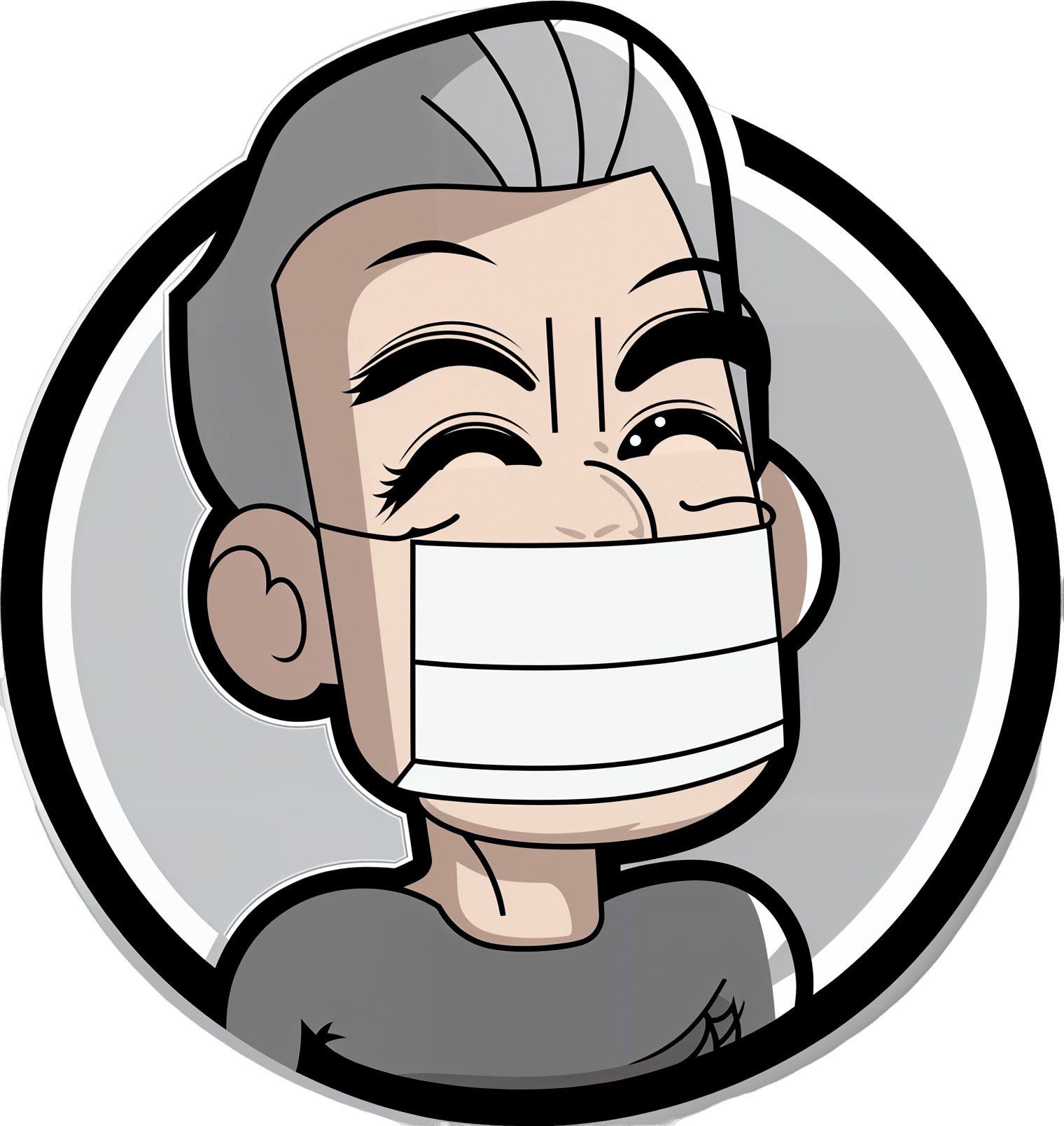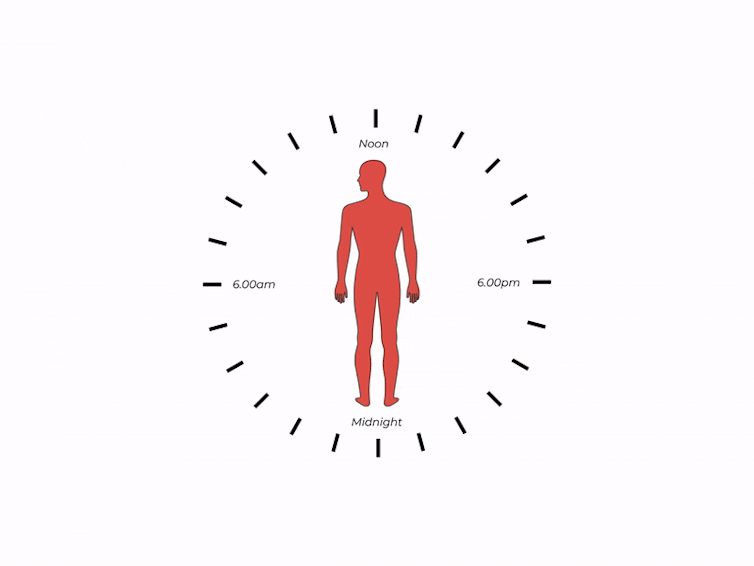
Mythbusting The Mask Debate
10almonds is reader-supported. We may, at no cost to you, receive a portion of sales if you purchase a product through a link in this article.
Mythbusting The Mask Debate

We asked you for your mask policy this respiratory virus season, and got the above-depicted, below-described, set of responses:
- A little under half of you said you will be masking when practical in indoor public places
- A little over a fifth of you said you will mask only if you have respiratory virus symptoms
- A little under a fifth of you said that you will not mask, because you don’t think it helps
- A much smaller minority of you (7%) said you will go with whatever people around you are doing
- An equally small minority of you said that you will not mask, because you’re not concerned about infections
So, what does the science say?
Wearing a mask reduces the transmission of respiratory viruses: True or False?
True…with limitations. The limitations include:
- The type of mask
- A homemade polyester single-sheet is not the same as an N95 respirator, for instance
- How well it is fitted
- It needs to be a physical barrier, so a loose-fitting “going through the motions” fit won’t help
- The condition of the mask
- And if applicable, the replaceable filter in the mask
- What exactly it has to stop
- What kind of virus, what kind of viral load, what kind of environment, is someone coughing/sneezing, etc
More details on these things can be found in the link at the end of today’s main feature, as it’s more than we could fit here!
Note: We’re talking about respiratory viruses in general in this main feature, but most extant up-to-date research is on COVID, so that’s going to appear quite a lot. Remember though, even COVID is not one beast, but many different variants, each with their own properties.
Nevertheless, the scientific consensus is “it does help, but is not a magical amulet”:
- 2021: Effectiveness of Face Masks in Reducing the Spread of COVID-19: A Model-Based Analysis
- 2022: Why Masks are Important during COVID‐19 Pandemic
- 2023: The mitigating effect of masks on the spread of COVID-19
Wearing a mask is actually unhygienic: True or False?
False, assuming your mask is clean when you put it on.
This (the fear of breathing more of one’s own germs in a cyclic fashion) was a point raised by some of those who expressed mask-unfavorable views in response to our poll.
There have been studies testing this, and they mostly say the same thing, “if it’s clean when you put it on, great, if not, then well yes, that can be a problem”:
❝A longer mask usage significantly increased the fungal colony numbers but not the bacterial colony numbers.
Although most identified microbes were non-pathogenic in humans; Staphylococcus epidermidis, Staphylococcus aureus, and Cladosporium, we found several pathogenic microbes; Bacillus cereus, Staphylococcus saprophyticus, Aspergillus, and Microsporum.
We also found no associations of mask-attached microbes with the transportation methods or gargling.
We propose that immunocompromised people should avoid repeated use of masks to prevent microbial infection.❞
Source: Bacterial and fungal isolation from face masks under the COVID-19 pandemic
Wearing a mask can mean we don’t get enough oxygen: True or False?
False, for any masks made-for-purpose (i.e., are by default “breathable”), under normal conditions:
- COVID‐19 pandemic: do surgical masks impact respiratory nasal functions?
- Performance Comparison of Single and Double Masks: Filtration Efficiencies, Breathing Resistance and CO2 Content
However, wearing a mask while engaging in strenuous best-effort cardiovascular exercise, will reduce VO₂max. To be clear, you will still have more than enough oxygen to function; it’s not considered a health hazard. However, it will reduce peak athletic performance:
…so if you are worrying about whether the mask will impede you breathing, ask yourself: am I engaging in an activity that requires my peak athletic performance?
Also: don’t let it get soaked with water, because…
Writer’s anecdote as an additional caveat: in the earliest days of the COVID pandemic, I had a simple cloth mask on, the one-piece polyester kind that we later learned quite useless. The fit wasn’t perfect either, but one day I was caught in heavy rain (I had left it on while going from one store to another while shopping), and suddenly, it fitted perfectly, as being soaked through caused it to cling beautifully to my face.
However, I was now effectively being waterboarded. I will say, it was not pleasant, but also I did not die. I did buy a new mask in the next store, though.
tl;dr = an exception to “no it won’t impede your breathing” is that a mask may indeed impede your breathing if it is made of cloth and literally soaked with water; that is how waterboarding works!
Want up-to-date information?
Most of the studies we cited today were from 2022 or 2023, but you can get up-to-date information and guidance from the World Health Organization, who really do not have any agenda besides actual world health, here:
Coronavirus disease (COVID-19): Masks | Frequently Asked Questions
At the time of writing this newsletter, the above information was last updated yesterday.
Take care!
Don’t Forget…
Did you arrive here from our newsletter? Don’t forget to return to the email to continue learning!
Recommended
Learn to Age Gracefully
Join the 98k+ American women taking control of their health & aging with our 100% free (and fun!) daily emails:
-
What you need to know about FLiRT, an emerging group of COVID-19 variants
10almonds is reader-supported. We may, at no cost to you, receive a portion of sales if you purchase a product through a link in this article.
What you need to know
- COVID-19 wastewater levels are currently low, but a recent group of variants called FLiRT is making headlines.
- KP.2 is one of several FLiRT variants, and early lab tests suggest that it’s more infectious than JN.1.
- Getting infected with any COVID-19 variant can cause severe illness, heart problems, and death.
KP.2, a new COVID-19 variant, is now dominant in the United States. Lab tests suggest that it may be more infectious than JN.1, the variant that was dominant earlier this year.
Fortunately, there’s good news: Current wastewater data shows that COVID-19 infection rates are low. Still, experts are closely watching KP.2 to see if it will lead to an uptick in infections.
Read on to learn more about KP.2 and how to stay informed about COVID-19 cases in your area.
Where can I find data on COVID-19 cases in my area?
Hospitals are no longer required to report COVID-19 hospital admissions or hospital capacity to the Department of Health and Human Services. However, wastewater-based epidemiology (WBE) estimates the number of COVID-19 infections in a community based on the amount of COVID-19 viral particles detected in local wastewater.
View this map of wastewater data from the CDC to visualize COVID-19 infection rates throughout the U.S., or look up COVID-19 wastewater trends in your state.
What do we know so far about the new variant?
Early lab tests suggest that KP.2—one of a group of emerging variants called FLiRT—is similar to the previously dominant variant, JN.1, but it may be more infectious. If you had JN.1, you may still get reinfected with KP.2, especially if it’s been several months or longer since your last COVID-19 infection.
A CDC spokesperson said they have no reason to believe that KP.2 causes more severe illness than other variants. Experts are closely watching KP.2 to see if it will lead to an uptick in COVID-19 cases.
How can I protect myself from COVID-19 variants?
Staying up to date on COVID-19 vaccines reduces your risk of severe illness, long COVID, heart problems, and death. The CDC recommends that people 65 and older and immunocompromised people receive an additional dose of the updated COVID-19 vaccine this spring.
Wearing a high-quality, well-fitting mask reduces your risk of contracting COVID-19 and spreading it to others. At indoor gatherings, improving ventilation by opening doors and windows, using high-efficiency particulate air (HEPA) filters, and building your own Corsi-Rosenthal box can also reduce the spread of COVID-19.
This article first appeared on Public Good News and is republished here under a Creative Commons license.
Share This Post
-
Our Top 5 Spices: How Much Is Enough For Benefits?
10almonds is reader-supported. We may, at no cost to you, receive a portion of sales if you purchase a product through a link in this article.
A spoonful of pepper makes the… Hang on, no, that’s not right…
We know that spices are the spice of life, and many have great health-giving qualities. But…
- How much is the right amount?
- What’s the minimum to get health benefits?
- What’s the maximum to avoid toxicity?
That last one always seems like a scary question, but please bear in mind: everything is toxic at a certain dose. Oxygen, water, you-name-it.
On the other hand, many things have a toxicity so low that one could not physically consume it sufficiently faster than the body eliminates it, to get a toxic build-up.
Consider, for example, the €50 banknote that was nearly withdrawn from circulation because one of the dyes used in it was found to be toxic. However, the note remained in circulation after scientists patiently explained that a person would have to eat many thousands of them to get a lethal dose.
So, let’s address these questions in reverse order:
What’s the maximum to avoid toxicity?
In the case of the spices we’ll look at today, the human body generally* has high tolerance for them if eaten at levels that we find comfortable eating.
*IMPORTANT NOTE: If you have (or may have) a medical condition that may be triggered by spices, go easier on them (or if appropriate, abstain completely) after you learn about that.
Check with your own physician if unsure, because not only are we not doctors, we’re specifically not your doctors, and cannot offer personalized health advice.
We’re going to be talking in averages and generalizations here. Caveat consumator.
For most people, unless you are taking the spice in such quantities that you are folding space and seeing the future, or eating them as the main constituents of your meal rather than an embellishment, you should be fine. Please don’t enter a chilli-eating contest and sue us.
What is the minimum to get health benefits and how much should we eat?
The science of physiology generally involves continuous rather than discrete data, so there’s not so much a hard threshold, as a point at which the benefits become significant. The usefulness of most nutrients we consume, be they macro- or micro-, will tend to have a bell curve.
In other words, a tiny amount won’t do much, the right amount will have a good result, and usefulness will tail off after that point. To that end, we’re going to look at the “sweet spot” of peaking on the graph.
Also note: the clinical dose is the dose of the compound, not the amount of the food that one will need to eat to get that dose. For example, food x containing compound y will not usually contain that compound at 100% rate and nothing else. We mention this so that you’re not surprised when we say “the recommended dose is 5mg of compound, so take a teaspoon of this spice”, for example.
Further note: we only have so much room here, so we’re going to list only the top benefits, and not delve into the science of them. You can see the related main features for more details, though!
The “big 5” health-giving spices, with their relevant active compound:
- Black pepper (piperine)
- Hot pepper* (capsaicin)
- Garlic (allicin)
- Ginger (gingerol)
- Turmeric (curcumin**)
*Cayenne pepper is very high in capsaicin; chilli peppers are also great
**not the same thing as cumin, which is a completely different plant. Cumin does have some health benefits of its own, but not in the same league as the spices above, and there’s only so much we have room to cover today.
Black pepper
- Benefits: antioxidant, anti-cancer, boosts bioavailability of other nutrients, aids digestion
- Dosage: 5–20mg for benefits
- Suggestion: ½ teaspoon of black pepper is sufficient for benefits. However, this writer’s kitchen dictum in this case is “if you can’t see the black pepper in/on the food, add more”—but that’s more about taste!
- Related main feature: Black Pepper’s Anti-Cancer Arsenal (And More)
Hot Pepper
- Benefits: anti-inflammatory, metabolism accelerator
- Dosage: 6mg gives benefits, 500mg is a common dose in capsules
- Suggestion: if not making a spicy dish, consider using a teaspoon of cayenne as part of the seasoning for rice or potatoes
- Related main feature: Capsaicin For Weight Loss And Against Inflammation
Garlic
- Benefits: heart health, blood sugar balancing, anti-cancer
- Dosage: 4–8µg for benefits
- Suggestion: 1–2 cloves daily is generally good. However, cooking reduces allicin content (and so does oxidation after cutting/crushing), so you may want to adjust accordingly if doing those things.
- Related main feature: The Many Health Benefits Of Garlic
Ginger
- Benefits: anti-inflammatory, antioxidant, anti-nausea
- Dosage: 3–4g for benefits
- Suggestion: 1 teaspoon grated raw ginger or ½ a teaspoon powdered ginger, can be used in baking or as part of the seasoning for a stir-fry
- Related main feature: Ginger Does A Lot More Than You Think
Turmeric
- Benefits: anti-inflammatory, anti-cancer
- Dosage: 500–2000mg for benefits
- Suggestion: ¼ teaspoon per day is sufficient for benefits; ½ teaspoon dropped into the water when cooking rice will infuse the rice with turmeric (which is very water-soluble), turn the rice a pretty golden color, and not affect the flavor. Throw in some black pepper as it increases the bioavailability of curcumin up to 2000%
- Related main feature: Why Curcumin (Turmeric) Is Worth Its Weight In Gold
Closing notes
The above five spices are very healthful for most people. Personal physiology can and will vary, so if in doubt, a) check with your doctor b) start at lowest doses and establish your tolerance (or lack thereof).
Enjoy, and stay well!
Share This Post
-
Before You Eat Breakfast: 3 Surprising Facts About Intermittent Fasting
10almonds is reader-supported. We may, at no cost to you, receive a portion of sales if you purchase a product through a link in this article.
Dr. William Li is well-known for his advocacy of “eating to beat disease”, and/but today he has advice for us about not eating to beat disease. In moderation, of course, thus: intermittent fasting.
The easy way
Dr. Li explains the benefits of intermittent fasting; how it improves the metabolism and gives the body a chance to do much-needed maintainance, including burning off any excess fat we had hanging around.
However, rather than calling for us to do anything unduly Spartan, he points out that it’s already very natural for us to fast while sleeping, so we only need to add a couple of hours before and after sleeping (assuming an 8 hour sleep), to make it to a 12-hour fast for close to zero effort and probably no discomfort.
And yes, he argues that a 12-hour fast is beneficial, and even if 16 hours would be better, we do not need to beat ourselves up about getting to 16; what is more important is sustainability of the practice.
Dr. Li advocates for flexibility in fasting, and that it should be done by what manner is easiest, rather than trying to stick to something religiously (of course, if you do fast for religious reasons, that is another matter, and/but beyond the scope of this today).
For more information on each of these, as well as examples and tips, enjoy:
Click Here If The Embedded Video Doesn’t Load Automatically!
Want to learn more?
You might also like to read:
- Intermittent Fasting: What’s the truth?
- 16/8 Intermittent Fasting For Beginners
- Meal Timings & Health: How Important Is Breakfast?
Take care!
Share This Post
Related Posts
-
16 Overlooked Autistic Traits In Women
10almonds is reader-supported. We may, at no cost to you, receive a portion of sales if you purchase a product through a link in this article.
We hear a lot about “autism moms”, but Taylor Heaton is an autistic mom, diagnosed as an adult, and she has insights to share about overlooked autistic traits in women.
The Traits
- Difficulty navigating romantic relationships: often due to misreading signs
- Difficulty understanding things: including the above, but mostly: difficulty understanding subtext, when people leave things as “surely obvious”. Autistic women are likely to be aware of the possible meanings, but unsure which it might be, and may well guess wrongly.
- Masking: one of the reasons for the gender disparity in diagnosis is that autistic women are often better at “masking”, that is to say, making a conscious effort to blend in to allistic society—often as a result of being more societally pressured to do so.
- Honesty: often to a fault
- Copy and paste: related to masking, this is about consciously mirroring others in an effort to put them at ease and be accepted
- Being labelled sensitive and/or gifted: usually this comes at a young age, but the resultant different treatment can have a lifetime effect
- Secret stims: again related to masking, and again for the same reasons that displaying autistic symptoms is often treated worse in women, autistic women’s stims tend to be more subtle.
- Written communication: autistic women are often more comfortable with the written word than the spoken
- Leadership: autistic women will often gravitate to leadership roles, partly as a survival mechanism
- Gaslighting: oneself, e.g. “If this person did this without that, then I can to” (without taking into account that maybe the circumstances are different, or maybe they actually did lean on crutches that you didn’t know were there, etc).
- Inner dialogue: rich inner dialogue, but unable to express it outwardly—often because of the sheer volume of thoughts per second.
- Fewer female friends: often few friends overall, for that matter, but there’s often a gender imbalance towards male friends, or where there isn’t, towards more masculine friends at least.
- Feeling different: often a matter of feeling one does not meet standard expectations in some fashion
- School: autistic women are often academically successful
- Special interests: often more “socially accepted” interests than autistic men’s.
- Flirting: autistic women are often unsure how to flirt or what to do about it, which can result in simple directness instead
For more details on all of these, enjoy:
Click Here If The Embedded Video Doesn’t Load Automatically!
Related reading:
You might like a main feature of ours from not long back:
Miss Diagnosis: Anxiety, ADHD, & Women
Take care!
Don’t Forget…
Did you arrive here from our newsletter? Don’t forget to return to the email to continue learning!
Learn to Age Gracefully
Join the 98k+ American women taking control of their health & aging with our 100% free (and fun!) daily emails:
-
Are GMOs Good Or Bad For Us?
10almonds is reader-supported. We may, at no cost to you, receive a portion of sales if you purchase a product through a link in this article.
Unzipping Our Food’s Genes
In yesterday’s newsletter, we asked you for your (health-related) views on GMOs.
But what does the science say?
First, a note on terms
Technically, we (humans) have been (g)enetically (m)odifying (o)rganisms for thousands of years.
If you eat a banana, you are enjoying the product of many generations of artificial selection, to change its genes to produce a fruit that is soft, sweet, high in nutrients, and digestible without cooking. The original banana plant would be barely recognizable to many people now (and also, barely edible). We’ve done similarly with countless other food products.
So in this article, we’re going to be talking exclusively about modern genetic modification of organisms, using exciting new (ish, new as in “in the last century”) techniques to modify the genes directly, in a copy-paste fashion.
For more details on the different kinds of genetic modification of organisms, and how they’re each done (including the modern kinds), check out this great article from Sciencing, who explain it in more words than we have room for here:
Sciencing | How Are GMOs Made?
(the above also offers tl;dr section summaries, which are great too)
GMOS are outright dangerous (cancer risks, unknown risks, etc): True or False?
False, so far as we know, in any direct* fashion. Obviously “unknown risks” is quite a factor, since those are, well, unknown. But GMOs on the market undergo a lot of safety testing, and have invariably passed happily.
*However! Glyphosate (the herbicide), on the other hand, has a terrible safety profile and is internationally banned in very many countries for this reason.
Why is this important? Because…
- in the US (and two out of ten Canadian provinces), glyphosate is not banned
- In the US (and we may hypothesize, those two Canadian provinces) one of the major uses of genetic modification of foodstuffs is to make it resistant to glyphosate
- Consequently, GMO foodstuffs grown in those places have generally been liberally doused in glyphosate
So… It’s not that the genetic modification itself makes the food dangerous and potentially carcinogenic (it doesn’t), but it is that the genetic modification makes it possible to use a lot more glyphosate without losing crops to glyphosate’s highly destructive properties.
Which results in the end-consumer eating glyphosate. Which is not good. For example:
❝Following the landmark case against Monsanto, which saw them being found liable for a former groundskeeper, 46 year old Dewayne Johnson’s cancer, 32 countries have to date banned the use of Glyphosate, the key ingredient in Monsanto’s Roundup weed killer. The court awarded Johnson R4.2 billion in damages finding Monsanto “acted with malice or oppression”.❞
Source: see below!
You can read more about where glyphosate is and isn’t banned, here:
33 countries ban the use of Glyphosate—the key ingredient in Roundup
For the science of this (and especially the GMO → glyphosate use → cancer pipeline), see:
Use of Genetically Modified Organism (GMO)-Containing Food Products in Children
GMOs are extra healthy because of the modifications (they were designed for that, right?): True or False?
True or False depending on who made them and why! As we’ve seen above, not all companies seem to have the best interests of consumer health in mind.
However, they can be! Here are a couple of great examples:
❝Recently, two genome-edited crops targeted for nutritional improvement, high GABA tomatoes and high oleic acid soybeans, have been released to the market.
Nutritional improvement in cultivated crops has been a major target of conventional genetic modification technologies as well as classical breeding methods❞
Source: Drs. Nagamine & Ezura
Read in full: Genome Editing for Improving Crop Nutrition
(note, they draw a distinction of meaning between genome editing and genetic modification, according to which of two techniques is used, but for the purposes of our article today, this is under the same umbrella)
Want to know more?
If you’d like to read more about this than we have room for here, here’s a great review in the Journal of Food Science & Nutrition:
Should we still worry about the safety of GMO foods? Why and why not? A review
Take care!
Don’t Forget…
Did you arrive here from our newsletter? Don’t forget to return to the email to continue learning!
Learn to Age Gracefully
Join the 98k+ American women taking control of their health & aging with our 100% free (and fun!) daily emails:
-
How light tells you when to sleep, focus and poo
10almonds is reader-supported. We may, at no cost to you, receive a portion of sales if you purchase a product through a link in this article.
This is the next article in our ‘Light and health’ series, where we look at how light affects our physical and mental health in sometimes surprising ways. Read other articles in the series.
Exposure to light is crucial for our physical and mental health, as this and future articles in the series will show.
But the timing of that light exposure is also crucial. This tells our body to wake up in the morning, when to poo and the time of day to best focus or be alert. When we’re exposed to light also controls our body temperature, blood pressure and even chemical reactions in our body.
But how does our body know when it’s time to do all this? And what’s light got to do with it?
nymphoenix/Shutterstock What is the body clock, actually?
One of the key roles of light is to re-set our body clock, also known as the circadian clock. This works like an internal oscillator, similar to an actual clock, ticking away as you read this article.
But rather than ticking you can hear, the body clock is a network of genes and proteins that regulate each other. This network sends signals to organs via hormones and the nervous system. These complex loops of interactions and communications have a rhythm of about 24 hours.
In fact, we don’t have one clock, we have trillions of body clocks throughout the body. The central clock is in the hypothalamus region of the brain, and each cell in every organ has its own. These clocks work in concert to help us adapt to the daily cycle of light and dark, aligning our body’s functions with the time of day.
However, our body clock is not precise and works to a rhythm of about 24 hours (24 hours 30 minutes on average). So every morning, the central clock needs to be reset, signalling the start of a new day. This is why light is so important.
The central clock is directly connected to light-sensing cells in our retinas (the back of the eye). This daily re-setting of the body clock with morning light is essential for ensuring our body works well, in sync with our environment.
In parallel, when we eat food also plays a role in re-setting the body clock, but this time the clock in organs other than the brain, such as the liver, kidneys or the gut.
So it’s easy to see how our daily routines are closely linked with our body clocks. And in turn, our body clocks shape how our body works at set times of the day.
What time of day?
Matt Garrow/The Conversation. Adapted from Delos, CC BY Let’s take a closer look at sleep
The naturally occurring brain hormone melatonin is linked to our central clock and makes us feel sleepy at certain times of day. When it’s light, our body stops making melatonin (its production is inhibited) and we are alert. Closer to bedtime, the hormone is made, then secreted, making us feel drowsy.
Our sleep is also partly controlled by our genes, which are part of our central clock. These genes influence our chronotype – whether we are a “lark” (early riser), “night owl” (late sleeper) or a “dove” (somewhere in between).
But exposure to light at night when we are supposed to be sleeping can have harmful effects. Even dim light from light pollution can impair our heart rate and how we metabolise sugar (glucose), may lead to psychiatric disorders such as depression, anxiety and bipolar disorder, and increases the overall risk of premature death.
The main reason for these harmful effects is that light “at the wrong time” disturbs the body clock, and these effects are more pronounced for “night owls”.
This “misaligned” exposure to light is also connected to the detrimental health effects we often see in people who work night shifts, such as an increased risk of cancer, diabetes and heart disease.
How about the gut?
Digestion also follows a circadian rhythm. Muscles in the colon that help move waste are more active during the day and slow down at night.
The most significant increase in colon movement starts at 6.30am. This is one of the reasons why most people feel the urge to poo in the early morning rather than at night.
The gut’s day-night rhythm is a direct result of the action of the gut’s own clock and the central clock (which synchronises the gut with the rest of the body). It’s also influenced by when we eat.
At 6.30am, your gut really begins to get going for the day. Rendra Dria Septia Aji/Shutterstock How about focusing?
Our body clock also helps control our attention and alertness levels by changing how our brain functions at certain times of day. Attention and alertness levels improve in the afternoon and evening but dip during the night and early morning.
Those fluctuations impact performance and can lead to decreased productivity and an increased risk of errors and accidents during the less-alert hours.
So it’s important to perform certain tasks that require our attention at certain times of day. That includes driving. In fact, disruption of the circadian clock at the start of daylight savings – when our body hasn’t had a chance to adapt to the clocks changing – increases the risk of a car accident, particularly in the morning.
What else does our body clock control?
Our body clock influences many other aspects of our biology, including:
- physical performance by controlling the activity of our muscles
- blood pressure by controlling the system of hormones involved in regulating our blood volume and blood vessels
- body temperature by controlling our metabolism and our level of physical activity
- how our body handles drugs and toxins by controlling enzymes involved in how the liver and kidneys eliminate these substances from the body.
If you can, avoid driving long distances at night, as you’ll be less alert. trendobjects/Shutterstock Morning light is important
But what does this all mean for us? Exposure to light, especially in the morning, is crucial for synchronising our circadian clock and bodily functions.
As well as setting us up for a good night’s sleep, increased morning light exposure benefits our mental health and reduces the risk of obesity. So boosting our exposure to morning light – for example, by going for a walk, or having breakfast outside – can directly benefit our mental and metabolic health.
However, there are other aspects about which we have less control, including the genes that control our body clock.
Frederic Gachon, Associate Professor, Physiology of Circadian Rhythms, Institute for Molecular Bioscience, The University of Queensland and Benjamin Weger, NHMRC Emerging Leadership Fellow Institute for Molecular Bioscience, The University of Queensland
This article is republished from The Conversation under a Creative Commons license. Read the original article.
Don’t Forget…
Did you arrive here from our newsletter? Don’t forget to return to the email to continue learning!
Learn to Age Gracefully
Join the 98k+ American women taking control of their health & aging with our 100% free (and fun!) daily emails:












